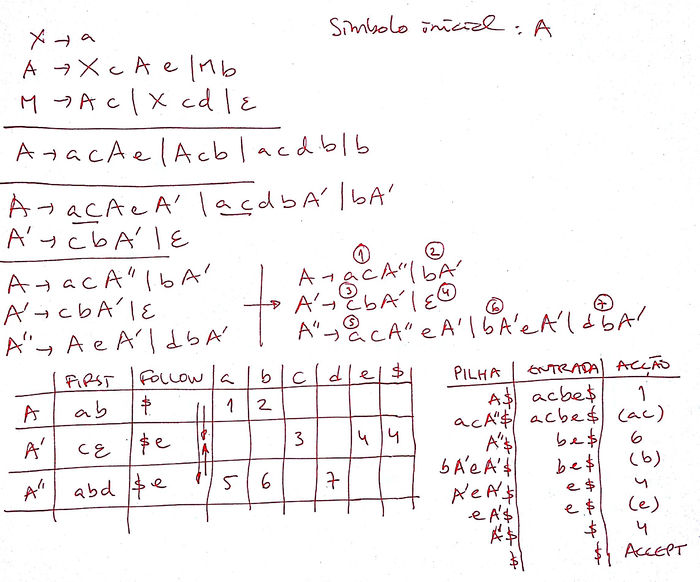Top-Down Parsing/Exercise 7: Difference between revisions
From Wiki**3
| (6 intermediate revisions by the same user not shown) | |||
| Line 1: | Line 1: | ||
{{TOCright}} | {{TOCright}} | ||
= Problem = | == Problem == | ||
Consider the following grammar, where '''<tt>A</tt>''' is the initial symbol and '''<tt>{a,b,c,d,e}</tt>''' is the set of terminal symbols: | Consider the following grammar, where '''<tt>A</tt>''' is the initial symbol and '''<tt>{a,b,c,d,e}</tt>''' is the set of terminal symbols: | ||
| Line 6: | Line 6: | ||
X -> a | X -> a | ||
A -> X c A e | M b | A -> X c A e | M b | ||
M -> A c | X c d | | M -> A c | X c d | ε | ||
# Examine the grammar and rewrite it so that an LL(1) predictive parser can be built for the corresponding language. | # Examine the grammar and rewrite it so that an LL(1) predictive parser can be built for the corresponding language. | ||
| Line 14: | Line 14: | ||
== Solution == | == Solution == | ||
[[Image:CompilersTopDownParsingExercise7.jpg]] | [[Image:CompilersTopDownParsingExercise7.jpg|700px]] | ||
[[category: | [[category:Compiladores]] | ||
[[category: | [[category:Ensino]] | ||
Latest revision as of 14:04, 30 April 2024
Problem
Consider the following grammar, where A is the initial symbol and {a,b,c,d,e} is the set of terminal symbols:
X -> a A -> X c A e | M b M -> A c | X c d | ε
- Examine the grammar and rewrite it so that an LL(1) predictive parser can be built for the corresponding language.
- Compute the FIRST and FOLLOW sets for all non-terminal symbols in the new grammar and build the parse table.
- Show the analysis table (stack, input, and actions) for the parsing process of the acbe input sequence.
